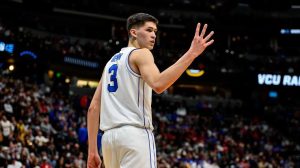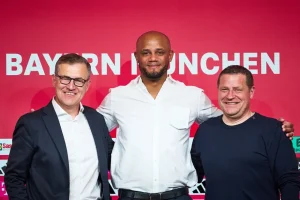
Why the Chicago Bulls Front Office Must Open Up More Minutes Next Season.
The Chicago Bulls enter the 2025 off-season with more questions than answers. After another underwhelming campaign, marked by inconsistency, injuries, and a lack of identity, it’s clear that change is needed—starting from the front office down to the playing rotation. While big trades or coaching changes often dominate headlines, a subtler yet equally impactful move lies in reshaping the team’s minute distribution. Specifically, the Bulls front office must prioritize opening up more playing time for younger, developing players.
Stagnation of the Current Core
The current Bulls core—Zach LaVine, DeMar DeRozan, and Nikola Vučević—has now been together for multiple seasons without meaningful postseason success. Despite flashes of competitiveness, the trio has struggled with injuries and overlapping skill sets that haven’t translated into consistent winning. With DeRozan aging and LaVine’s long-term health concerns, it’s time to shift the focus from maximizing veteran minutes to investing in the team’s future.
The franchise has hovered in NBA purgatory—too good to land a top draft pick, but not good enough to contend. That middle ground is dangerous, especially for a team with limited cap flexibility and few blue-chip assets. Giving more minutes to younger talent isn’t just about development; it’s about realigning the organization with a long-term vision.
Young Talent Waiting in the Wings
One of the biggest frustrations for Bulls fans has been the underutilization of promising young players. Guard Coby White finally saw a breakout year in 2024–25 when injuries forced him into a larger role. His improved defense, decision-making, and leadership have solidified his place in the team’s future. That success underscores what can happen when younger players are given the space to grow.
Patrick Williams, while inconsistent, still holds untapped potential. Injuries have certainly hampered his development, but the lack of a defined role hasn’t helped either. With more minutes and responsibilities, Williams could grow into the versatile two-way forward the Bulls desperately need.
Other prospects like Dalen Terry, Julian Phillips, and rookie additions from the 2024 draft have shown flashes of promise. Terry, in particular, offers length, hustle, and defensive upside. Phillips, an athletic wing, deserves more reps to refine his game in real situations. Even under-the-radar signings or two-way players could thrive with increased opportunities.
Development Requires Real Minutes
One of the fundamental truths in the NBA is that practice and training only go so far—real development happens on the court. Young players need game experience to build confidence, understand defensive schemes, and learn how to respond to adversity. If the Bulls are serious about building a sustainable winning culture, they must resist the temptation to rely heavily on veterans who don’t factor into the future.
Moreover, this is the time to experiment. The 2025 season should be used as a testing ground, where rotations can be adjusted, roles redefined, and upside explored. The payoff may not be immediate, but the long-term benefits of trusting and empowering younger players are worth the short-term growing pains.
Managing the Transition
Of course, moving away from established veterans is not a simple process. Players like DeRozan and Vučević are still productive and command respect in the locker room. But the front office needs to be clear and strategic. Whether it means trading a veteran for future assets, staggering minutes differently, or simply being more deliberate about load management, opportunities must be carved out.
Head coach Billy Donovan also plays a pivotal role in this transition. He must be empowered by the front office to prioritize development without the pressure of chasing meaningless wins. That requires organizational alignment—from Artūras Karnišovas down to the coaching staff.
The Bigger Picture
Opening up more minutes for younger players is not just a basketball decision—it’s a cultural and philosophical shift. It signals to fans that the organization is forward-thinking, willing to pivot, and committed to growth. It also sends a message to the locker room: development and effort will be rewarded over name recognition or contract size.
In a crowded Eastern Conference, the Bulls must think differently if they hope to escape mediocrity. Other teams—like the Indiana Pacers and Orlando Magic—have embraced their youth movements and are now reaping the benefits. The Bulls can follow a similar path if they have the courage to pivot.
Conclusion
The Chicago Bulls are at a crossroads. Sticking with the current rotation and minute distribution guarantees more of the same: flashes of hope overshadowed by frustration. By opening up more minutes for younger players, the front office can lay the groundwork for a more competitive and exciting future. It’s time for Chicago to stop playing it safe and start investing in the players who could lead the franchise forward.
Would you like a version of this formatted for a blog or social media post?







